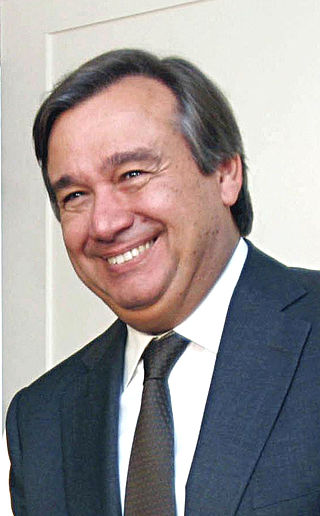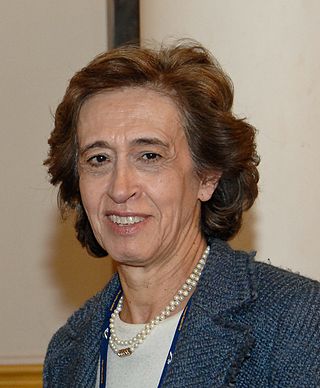
The 2005 Portuguese legislative election took place on 20 February. The election renewed all 230 members of the Assembly of the Republic.

The 1999 Portuguese legislative election took place on 10 October. The election renewed all 230 members of the Assembly of the Republic.

The 2002 Portuguese legislative election took place on 17 March. The election renewed all 230 members of the Assembly of the Republic.

The 1995 Portuguese legislative election took place on 1 October. The election renewed all 230 members of the Assembly of the Republic.

The 1991 Portuguese legislative election took place on 6 October. The election renewed all 230 members of the Assembly of the Republic. There was a reduction of 20 seats compared with previous elections,due to the 1989 Constitutional revision.

The 1985 Portuguese legislative election took place on 6 October. The election renewed all 250 members of the Assembly of the Republic.

The 2009 Portuguese legislative election was held on 27 September,to renew all 230 members of the Assembly of the Republic. The Socialist Party,led by incumbent Prime Minister JoséSócrates,won the largest number of seats,but didn't repeat the overall majority they gained in 2005.

The 2011 Portuguese legislative election was held on 5 June,to elect all 230 members of the Assembly of the Republic. Pedro Passos Coelho led the centre-right Social Democratic Party to victory over the Socialist Party,led by incumbent Prime Minister JoséSócrates. Despite a historically low turnout of less than 60% of registered voters,the right-wing won a clear mandate,winning nearly 130 MPs,more than 56% of the seats,and just over 50% of the vote. While the People's Party,continuing the trend they began in 2009,earned their best score since 1983,the Social Democrats exceeded the expected result in the opinion polls and won the same number of seats as they did in 2002,when the PSD was led by JoséManuel Durão Barroso. Of the twenty districts of the country,Pedro Passos Coelho's party won seventeen,including Lisbon,Porto,Faro,Portalegre,Castelo Branco,Coimbra,Santarém and the Azores,that tend to favor the Socialist Party.
Ana Mesquita is a Portuguese archaeologist. Since 2015 she has been a deputy in the Assembly of the Republic of Portugal representing the Unitary Democratic Coalition (CDU),which is a coalition between the Portuguese Communist Party (PCP),of which she is a member,and the Ecologist Party "The Greens".
Diana Ferreira is a Portuguese psychologist and politician. A member of the Portuguese Communist Party (PCP),she has been a deputy to the Assembly of the Republic of Portugal since September 2014,representing the Porto constituency.
Rosário Gambôa is a Portuguese politician. As a member of the Portuguese Socialist Party (PS),she has been a deputy in the Portuguese Assembly of the Republic since 2019,representing Porto. Prior to that,she was president of the Polytechnic Institute of Porto (IPP),a tertiary-level institute with 15,000 students.
Sofia Matos is a Portuguese politician. A member of the centre-right Social Democratic Party (PSD),Matos was elected to the Assembly of the Republic of Portugal in 2019 as a representative of the Porto constituency and re-elected in 2022,when she headed the PSD list for Porto.

Lisbon is one of the 22 multi-member constituencies of the Assembly of the Republic,the national legislature of Portugal. The constituency was established in 1976 when the Assembly of the Republic was established by the constitution following the restoration of democracy. It is conterminous with the district of Lisbon. The constituency currently elects 48 of the 230 members of the Assembly of the Republic using the closed party-list proportional representation electoral system. At the 2022 legislative election it had 1,919,958 registered electors.

Porto is one of the 22 multi-member constituencies of the Assembly of the Republic,the national legislature of Portugal. The constituency was established in 1976 when the Assembly of the Republic was established by the constitution following the restoration of democracy. It is conterminous with the district of Porto. The constituency currently elects 40 of the 230 members of the Assembly of the Republic using the closed party-list proportional representation electoral system. At the 2022 legislative election it had 1,589,053 registered electors.

Setúbal is one of the 22 multi-member constituencies of the Assembly of the Republic,the national legislature of Portugal. The constituency was established in 1976 when the Assembly of the Republic was established by the constitution following the restoration of democracy. It is conterminous with the district of Setúbal. The constituency currently elects 18 of the 230 members of the Assembly of the Republic using the closed party-list proportional representation electoral system. At the 2022 legislative election it had 745,594 registered electors.

Aveiro is one of the 22 multi-member constituencies of the Assembly of the Republic,the national legislature of Portugal. The constituency was established in 1976 when the Assembly of the Republic was established by the constitution following the restoration of democracy. It is conterminous with the district of Aveiro. The constituency currently elects 16 of the 230 members of the Assembly of the Republic using the closed party-list proportional representation electoral system. At the 2022 legislative election it had 642,623 registered electors.

Leiria is one of the 22 multi-member constituencies of the Assembly of the Republic,the national legislature of Portugal. The constituency was established in 1976 when the Assembly of the Republic was established by the constitution following the restoration of democracy. It is conterminous with the district of Leiria. The constituency currently elects ten of the 230 members of the Assembly of the Republic using the closed party-list proportional representation electoral system. At the 2022 legislative election it had 413,063 registered electors.

Coimbra is one of the 22 multi-member constituencies of the Assembly of the Republic,the national legislature of Portugal. The constituency was established in 1976 when the Assembly of the Republic was established by the constitution following the restoration of democracy. It is conterminous with the district of Coimbra. The constituency currently elects nine of the 230 members of the Assembly of the Republic using the closed party-list proportional representation electoral system. At the 2022 legislative election it had 374,935 registered electors.

Santarém is one of the 22 multi-member constituencies of the Assembly of the Republic,the national legislature of Portugal. The constituency was established in 1976 when the Assembly of the Republic was established by the constitution following the restoration of democracy. It is conterminous with the district of Santarém. The constituency currently elects nine of the 230 members of the Assembly of the Republic using the closed party-list proportional representation electoral system. At the 2022 legislative election it had 378,006 registered electors.

Viana do Castelo is one of the 22 multi-member constituencies of the Assembly of the Republic,the national legislature of Portugal. The constituency was established in 1976 when the Assembly of the Republic was established by the constitution following the restoration of democracy. It is conterminous with the district of Viana do Castelo. The constituency currently elects six of the 230 members of the Assembly of the Republic using the closed party-list proportional representation electoral system. At the 2022 legislative election it had 236,042 registered electors.












